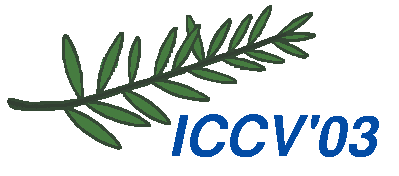ICCV 2003 Short Course
Learning and Vision: Discriminative Methods
Instructors:
Christopher Bishop (Microsoft Research Limited) and Paul Viola (Microsoft
Research).
Duration: 3.5 hours
Slides: Bishop, Viola.
Course Content
- Foundations:
- Inference and decision
- Discriminative versus generative approaches to
classification and regression
- Bayesian methods
- Feature selection
- Algorithms, architectures, and techniques:
- Multilayer neural networks
- Gaussian processes
- Support vector machines
- Decision trees
- Adaboost
- Memory based classification/estimation and lcoally-weighted
regression
- Estimating generalization: Cross-validation and ROC curves
- Building fast classifiers
- Applications:
- Face and object detection
- Recognition: Characters/faces/objects
- Body pose estimation
Biography
Chris Bishop graduated from Oxford with B.A. in Physics, and obtained
a PhD in Theoretical Physics from the University of Edinburgh a thesis
on quantum field theory. After several years working on the theory of
magnetically confined plasmas for the fusion programme, he developed an
interest in pattern recognition, and became Head of the Applied
Neurocomputing Centre at AEA Technology. In 1993 he was elected to a
Chair in the Department of Computer Science and Applied Mathematics at
Aston University, where he was a member of the Neural Computing Research
Group. He then took a sabbatical to be principal organiser of the six
month international research programme on Neural Networks and Machine
Learning at the Isaac Newton Institute for Mathematical Sciences in
Cambridge, which ran from July to December 1997.
After completion of the Newton Institute programme he joined the
Microsoft Research Laboratory in Cambridge, where he is Assistant
Director. At the same time he was elected to a Chair of Computer Science
at the University of Edinburgh where he is a member of the Institute for
Adaptive and Neural Computation in the Division of Informatics. He is
also a Fellow of Darwin College, Cambridge.
His research is concerned with the development and application of
probabilistic methods for inference and learning.
Before moving to Microsoft, Paul Viola was a researcher at
MERL and an Associate Professor of Computer Science and Engineering at
the Massachusetts Institute of Technology. He also spent two years as
a visiting scientist in the Computational Neurobiology of the Salk
Institute in San Diego. Paul has a broad background in advanced
computational techniques, publishing in the fields of computer vision,
machine learning, medical imaging, neurobiological vision, mobile
robotics, and automated drug design. Paul was a recipient of a
National Science Foundation Career award in 1998.
